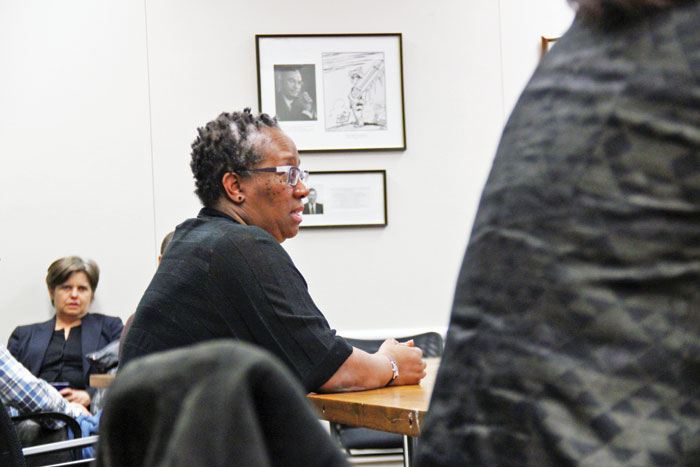Joanne St. Lewis, Common Law professor at the University of Ottawa and former McGill student, spoke at the annual Annie Macdonald Langstaff workshop last Friday. The workshop featured a discussion on the recent events in Ferguson, a city in Missouri that gained international attention in 2014 after Mike Brown, an unarmed black 18-year-old was shot and killed by white Police Officer Darren Wilson. Following the shooting, Ferguson became the site of several protests against racialized police brutality.
St. Lewis began the workshop by addressing why black Canadians should care about police brutality in the United States.
“[Ferguson] is an opportunity for us to see in a very concrete way something we experience in a more fractured, or specific and narrow way in Canada,” St. Lewis said. “The first thing I see as a black Canadian is […] they’re having my problem, except it’s so big that everyone can see it [….] They can actually get voice and space in the public domain to talk about [it].”
St. Lewis then spoke to the identity politics that often surround discourses of race. She highlighted herself as an example of how class and race can intersect, explaining that she was often asked why she cared about the issue.
“‘Why are you so into this Ferguson thing? [You’re] a lawyer […] you’re not living there. Aren’t you putting on a frame of oppression that doesn’t belong to you?’” St. Lewis listed as examples of the questions she would receive when broaching the topic with colleagues.
St. Lewis explained that she believed that the questions stemmed from people’s reluctance talk about race.
“The person I’m speaking to has decided that they know what it means to be authentically black, and apparently my legal training has disenfranchised me of my authenticity,” she said. “Instead of the person grappling with their own unwillingness to talk about racism […] they’re starting to shut down the conversation.”
The lack of representation of black people in societal positions of power contributes to the high incidences of racialized police brutality, St. Lewis said.
“It’s about who is administering justice and representation,” she said. “We have somewhere around 21 Law faculties in the country […yet] we don’t even have the equivalent of one black [law professor] per school. How many [black law students] actually get to the point that they’re senior associates and have enough network that they’re in the position to actually drive the engine of what they’re doing?”
Sarah Aladas, a student who attended the event, critiqued the idea that change could only come through the efforts of the oppressed group.
“The issue is that we shouldn’t care because we’re [a part of a race], but we should care because we’re human,” she said. “By trying to fight any type of inequality, sometimes we only make the barrier stronger in that we create an opposition.”
In response, St. Lewis highlighted the difference between social cohesion and legal advocacy against discrimination.
“At the end of the day, [for] social cohesion […] you want everybody to be invested in all the values,” St. Lewis said. “That is very different from legal analysis [….] There are strategies to think about gender, there’s another way of doing intersectionality […] and you need to […] obtain the mastery for your client.”
Law student and President of the Black Law Students’ Association of McGill Dominic Bell asked St. Lewis for general advice on leading discussions about race in Canada.
“With respect to this discourse that the United States is sort of a foil for Canada […] that it’s not as bad [in Canada] as it is in the United States […] how you go about piercing that sort of discourse?” Bell asked.
St. Lewis answered by highlighting the need for education and the awareness of the intersection of identities and privileges.
“I think one of the pieces is understanding and educating ourselves about what is happening,” she said. “It is about class to some extent […] if you are living in places where black people are economically disempowered, the type of racism that they are experiencing is every bit as blatant and clear as it is in the [United States].”







